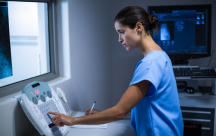November 03, 2025

Nursing plays a crucial role in the healthcare system, serving as the bridge between medical treatments and patient care. Nurses are required to demonstrate technical skills and consistently demonstrate a moral commitment to providing safe care. Despite the medical training and standards, certain errors creep up while performing medical duties. If the error in care is a deviation from the professional standard of care, the error would be classified as negligence. Malpractice or negligence are not just legal terms, and they indicate breaches in professional duty, which can negatively affect care and shrink the trust in the systems of care. The purpose of investigating these concepts at an academic level provides opportunities to observe their origin, progression, process, and mitigation processes, but ultimately to see the continued tension in the balance between accountability and patient-centered care in nursing practice.
Deeper Look At Negligence In Nursing
Nursing negligence is when someone does not act with the level of care a reasonably competent nurse would render under the same circumstances. It occurs from lapses in attention, judgment, or adherence to standards of care, and when it is unintentional, it can have dire consequences to patient safety and overall outcomes. Certain instances that qualify as negligence in the professional field are mentioned below.
● Failure to reposition patients who are bedbound, which in turn leads to another disease or deformity.
● Failure to check or accurately record vital signs and patient observations.
● Giving treatment without checking patient allergies or contraindications.
In addition to the ethical and professional ramifications, nursing negligence has legal consequences as well. A negligent act causing harm to a patient may create civil liability under applicable health law, which leads to lawsuits for damages, initiated by the patients. To determine the legal liability, the courts consider whether actions of the nurse deviated from an accepted standard of care and whether that deviation was the proximate cause of harm to the patient. Consequences of negligent acts can render the nurse liable to both civil actions and, in egregious cases, possible disciplinary actions from the nursing board, such as license suspension or revocation.
Preventing Negligence In Nursing
Ensuring that patients are provided with a standard level of care in the medical premises during their treatment is a basic nursing responsibility. Negligence often occurs from lapses in attention, lack of information, and failure to follow a professional clinical process. However, many of these risks can be curtailed through proactive prevention. There are several ways that healthcare institutions and nurses can reduce the potential for mistakes by promoting ongoing education, following clinical guidelines, developing effective communication skills, and systematic documentation.
1. Consistent Professional Training: Nursing is a dynamic profession, with ever-evolving medical knowledge, treatment protocols, and technologies for patient care. Continuing education helps to ensure that nurses are competent with the novel procedures, amended healthcare standards, and are aligning their actions with the current standards of best practice. While structured education improves nurses' clinical skills, it is also a means of reaffirming ethical decision-making and professional accountability. Through a culture of ongoing learning, the professional area of nursing will continue to notice and anticipate threats to patient safety and reduce errors, all while providing a safe and high-quality patient-centered care.
2. Systematic and Empathetic Work Practices: In order to mitigate neglect in nursing and provide the highest quality of care for patients, it is important to develop both systematic and empathetic work practices. A systematic approach to care includes using standard protocols, having ethical practice morals, and monitoring patient needs closely in order to prevent errors. Moreover, using empathy and thoughtfulness will allow nurses to anticipate patient concerns, detect signs of subtle deterioration, and respond to patient needs early enough to prevent rehospitalization.
3. Rigorous Adherence to Medical Protocols: Protocols, guidelines, and standard operating procedures are created using evidence-based approaches for safety and improved care outcomes. Following the protocols will limit the risk of mistakes, omissions, or inconsistent actions within the professional capacity. Accurate and complete documentation of assessments, treatments, and interventions reinforces accountability and continuity of care with the healthcare team.
Ensuring Ethical Responsibility In The Nursing Profession
Taking preventive actions against negligence in nursing is a collective responsibility that requires vigilance, education, and accountability to nursing standards. By prioritizing education and training, compliance with protocols, and adherence to a systematic, compassionate approach to converge workplace expectations, nurses can greatly reduce the potential for errors and maintain patient safety and well-being. These actions not only keep the patient from being harmed, but they also reinforce ethical action, professional accountability, and trust in healthcare professionals and institutions. Ultimately, promoting diligence, compassion, and accountability in all we do and the way we act ensures nursing remains a profession with outstanding excellence, integrity, and unquestionable attempts to provide patient-centered care.
Also Read: Importance of Patient Safety in Radiation Treatment

















